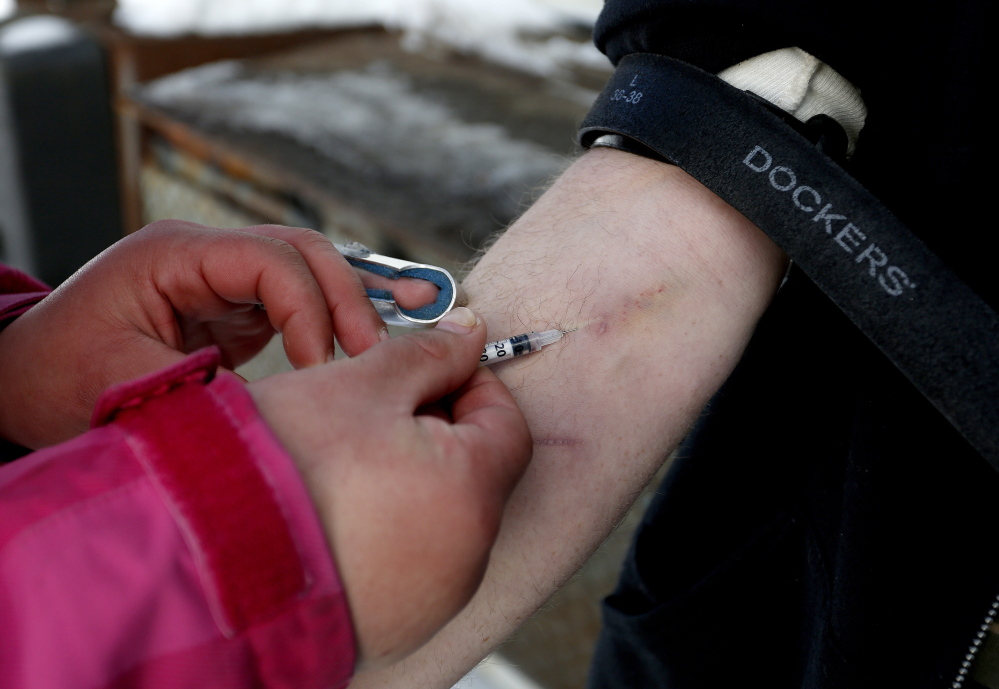The White House on Monday weighed in on the expanding heroin epidemic by adding modest resources to a federal drug program at a time when Maine is dealing with a surging population of addicts and heroin overdoses.
While the latest proposal is limited in scope – $2.5 million spread out over 15 states – public health advocates said they were encouraged by the high-level attention being paid to the issue. Earlier this year, the Obama administration advocated that Congress approve $133 million in new funding to reduce over-prescribing of opiate painkillers – a common pipeline into heroin addiction. Congress has yet to take action on the proposal.
The $2.5 million initiative announced Monday does not need congressional approval. The program would hire public health analysts and police officers – and work toward teaming up the two groups to attack heroin addiction together.
“The crisis is so bad it’s way beyond the point where it can be ignored,” said Dr. Lisa Letourneau, executive director of Maine Quality Counts, a nonprofit health public policy organization. “But we need so much more.”
The crisis has spurred Republicans and Democrats to talk about potential solutions to the issue – although specific policy ideas are often in short supply.
Gov. Paul LePage has called for an Aug. 26 summit on the state’s opiate problem, although details such as where and who would be invited to the summit have yet to be publicly released.
Meanwhile, one of LePage’s political allies – New Jersey Gov. Chris Christie – who is running in the Republican presidential primaries, has talked about the need for more treatment.
“We need to be talking about it and treating it like an illness, and not like some moral failure,” Christie said in May during a roundtable discussion on the heroin epidemic in Manchester, New Hampshire, according to the Newark Star-Ledger.
Democratic front-runner Hillary Clinton frequently mentions finding solutions to the heroin crisis during her visits to New Hampshire, telling the Manchester Union Leader this month that she has “met two grandmothers raising their grandchildren because of heroin.”
New Hampshire and Maine have reported particularly acute heroin epidemics, although heroin usage has increased nationally.
In Maine, the number of people seeking treatment for heroin addiction has more than tripled, from 1,115 in 2010 to 3,463 in 2014, according to the Maine Office of Substance Abuse. Overdose deaths in the state have soared from seven in 2011 to 57 in 2014.
At the same time, treatment programs are in short supply, and Mercy Recovery Center in Westbrook’s closing this summer further reduced the programs addicts can turn to try to cure their addictions.
Dr. Caroline Teschke, program manager of Portland’s India Street Clinical Services and Infectious Disease center, which operates the city’s needle exchange program for heroin users, said she has seen a shift over the past few months in how people and civic leaders talk about heroin addiction.
“What I am seeing is a recognition that this is everyone’s problem, not someone else’s problem,” Teschke said. “(President Obama’s proposal) is a typical first step, and it’s not nearly enough. But we’re going to find ways to make things happen.”
How public policy would change to fight heroin is a point of contention, although public health advocates say they hope common ground can be found.
Democrats say the state’s failure to expand Medicaid and the LePage administration tightening Medicaid eligibility is creating barriers for people seeking treatment for addiction.
LePage, meanwhile, has criticized the Legislature for failing to fully fund an initiative to add drug-trafficking agents that he claims would help stem the tide of illegal drugs coming into the state.
The White House proposal would take the first steps toward connecting law enforcement and public health agencies, by hiring one police officer and one public health analyst in 15 regions where high drug usage has been reported. The New England region would receive about $260,000 in federal funds, with the two employees working for all six New England states.
State Rep. Drew Gattine, D-Westbrook, chair of the Legislature’s health and human services committee, said it makes sense to try to break down the walls between the two groups.
“Any initiative that takes a global approach to the issue is going in the right direction,” Gattine said. “It is an epidemic that is only going to get worse. This must be a huge priority.”
Send questions/comments to the editors.



